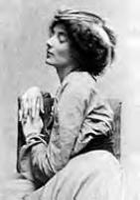Mina Loy Biography
Mina Loy born Mina Gertrude Lowy (December 27, 1882 – September 25, 1966) was an artist, poet, playwright, novelist, Futurist, actress, Christian Scientist, designer of lamps and bohemian extraordinaire. She was one of the last of the first generation modernists to achieve posthumous recognition. Her poetry was admired by T. S. Eliot, Ezra Pound, William Carlos Williams, Basil Bunting, Gertrude Stein, Francis Picabia and Yvor Winters, among others.
Loy's extremely original poems started to frequent smaller magazines such as Rogue, attracting the attention of the New York avant-garde. Once her work started to gain momentum, she began to publish poems and articles in more significant New York publications. In 1914, "Aphorisms on Futurism" was published in Alfred Stieglitz's Camera Work. "Parturition", her graphic depiction of childbirth, was printed in Trend.
In July 1915, Loy began to write what would be later known as "Songs to Joannes" [1]"(originally "Love songs"), a collection of modernist, avant-garde love poetry about her disenchantment with Giovanni Papini, another founding Futurist with whom Loy had been in a romantic relationship with in Florence. First readers of "Songs to Joannes" were shocked by Loy's forward expressions of human sexuality, particularly the grotesque and uncensored depictions of erotic desire and bodily functions. However, beyond the surface, Loy exposed the inequities and hypocrisies of male dominated society, and the resulting damage suffered by women physically and emotionally. She also unleashed criticism against supposedly superior theories held by fellows artists.
The present implies presence
thus
unauthorized by the present
these letters are left authorless --
...
